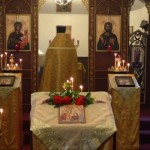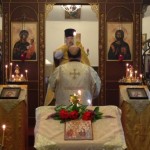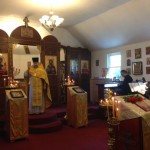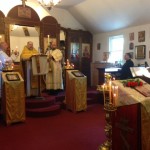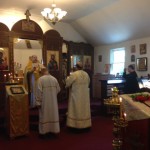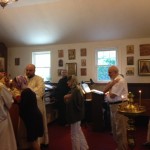On July 12, on the feast of the Holy Major Apostles Peter and Paul we had a beautiful liturgical celebration in our temple. St. George’s Rector, Archpriest Igor Tarasov served the Divine Liturgy.
After the reading from the Holy Gospel he preached a sermon:
“Today we celebrate feast of the Holy Major Apostles Peter and Paul. We finished St. Peter’s, or Apostolic fast, and now it is time to rejoice and celebrate the Apostolic feast. We should note that we do not have a fast before every holy day. Only four feasts in our calendar are preceded by a period of fasting, Holy Pascha, the Nativity of Christ, the Dormition of the Mother of God, and today’s feast of St. Peter and Paul. It is not accidental. In this way the Church reminds us of the most important persons in the history of our salvation: our Lord Jesus Christ, to whom we dedicate our fasts before the Nativity and before His Resurrection, Most Holy Mother of God, and Holy Apostles. Although today’s feast is not so great as, for instance, Holy Transfiguration of Christ, we have a fast before it. And that fast we finished yesterday. We kept the Apostolic fast in order to prepare for the Apostolic feast. We honored the works and endeavors of the Holy Apostles. And today we honor their blessed memory, celebrating the day of the two Major Disciples of Christ, St. Peter and St. Paul.”
“Almost everything about those two men was different. They had different background, different level of education, different personalities. The ways they came to believe in Christ was also different. We may recall that Holy Apostle Peter was one of the twelve Disciples called by our Lord Jesus Christ to follow Him. St. Peter was one of the first-called. He left his fishing nets on the banks of the Sea of Galilee and followed Christ. He was with his Master almost until the end of Jesus’ mission. We know that Peter showed some weakness, got scared when Jesus was taken into custody. He renounced His Teacher three times. But we also know that later Jesus forgave His close Disciple and entrusted to him the care of the Church. Very different was the way of St. Paul. He was first the persecutor of Christians, an enemy of Christ, one of the zealous Pharisees wishing to destroy the Disciples of Jesus. Paul did not follow Christ while the Messiah was on the earth. He persecuted His Disciples after Jesus ascended into heaven. Yet Paul was made worthy to become a major Apostle. Being on his way to the city of Damascus Paul received a revelation from God. It completely changed his life. He turned into a zealous follower of Jesus whom he persecuted before. Paul became a hard laborer in the field of Christ, a fervent preacher of Christianity, an Apostle of the Gentiles.”
“As I said, almost everything was different about those two men. Yet one thing they had in common – their firm and profound faith in the Lord Jesus Christ. This faith made them holy, it made them capable of so many endeavors. That faith finally led both of them to the same purpose – to be with their beloved Teacher, Lord Jesus Christ. It made them die for Christ on the same day in the capital city of Rome, the very day we celebrate their memory today. This is why the Church does not separate those two holy men. We almost never honor them separately, for you do not hear about any Orthodox temple dedicated to St. Peter or St. Paul separately. Only in Rome where they both ministered and martyred, there are two different basilicas of St. Peter and of St. Paul (which are presently Catholic). And we know that there is St. Paul Cathedral in London (which is Protestant).”
“Holy Scripture can tell us about the labors and endeavors of the Holy Apostles. Today’s Epistle lesson enumerates many works made, many tortures undergone and many dangers experienced by St. Paul (2 Cor. 11, 21-12, 9). St. Paul without praising himself, but very specifically describes that saying that compared to other Apostles he is “in labors more abundant, in stripes above measure, in prisons more frequently, in deaths often” (2 Cor. 11, 23). He then says that he will not boast in these heroic things. But he is trying to say that his true worthiness is that he was caught up to the third heaven, to paradise and “heard inexpressible words, which it is not lawful for a man to utter” (2 Cor. 12, 3).”
After the Liturgy dismissal the Rector and altar servers performed the rite of glorification before the icon of the Apostles in the middle of the church. They have sung the troparion, kontakion and magnification of the Saints.

